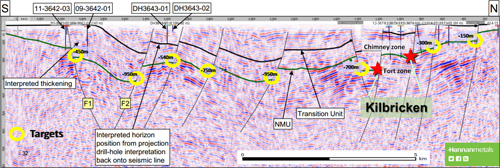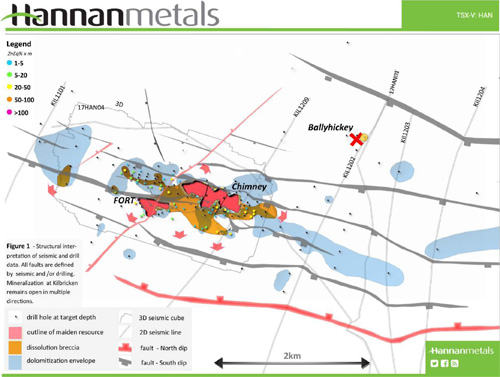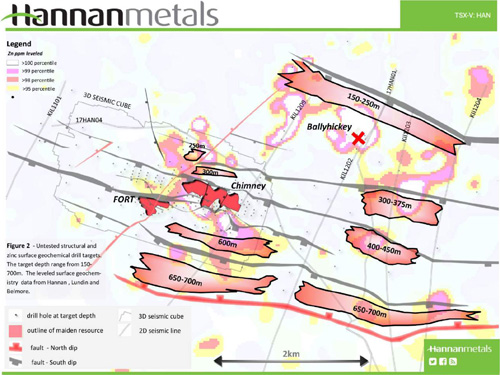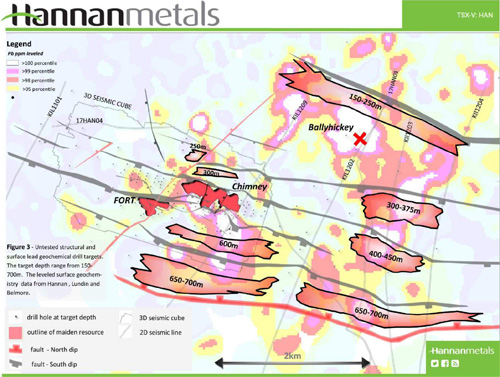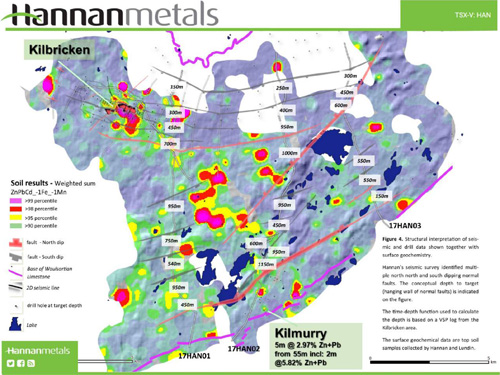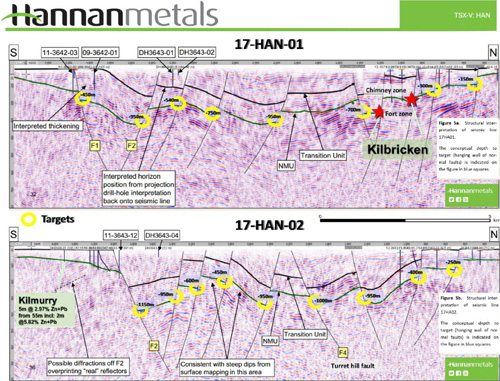Vancouver, Canada – Hannan Metals Limited ("Hannan" or the "Company") (TSX.V: HAN) (OTCPK: HANNF) is pleased to present initial results of processing and interpretation of the 40.6km seismic survey completed at the Company's Kilbricken zinc-lead-silver prospect and extensive 35,444 hectare Clare project in County Clare, Ireland.
Key points:
- The 40.6 line kilometre 2D seismic survey identified the high-grade zinc mineralized position at Kilbricken (Figure 5a) and defined multiple new high priority targets in similar settings over a combined 12 kilometres trend immediately along strike and up dip from the Kilbricken resource (Figures 1 to 3).
- Over the regional scale, multiple drill targets were also identified across much of the Clare project, including major north dipping faults that are well documented to preferentially host economic zinc deposits in Ireland;
- The 20,000 metre drill program currently being planned will initially test targets over the combined 12 kilometres trend immediately along strike and up dip from the Kilbricken resource;
- In total the Clare project now has 68 kilometres of 2D seismic and 5 square kilometres of 3D seismic surveys which constrain depths and geometry of potentially mineralized targets, which will substantially decrease exploration costs and increase exploration effectiveness.
- Seismic surveying is not a technique commonly used in hard rock mining while is endemic in the oil and gas industry. Hannan is one of few hard rock exploration companies to use the method globally. A variation on the seismic method won this years' Disrupt Mining competition at the PDAC in Toronto;
Mr Michael Hudson, Chairman & CEO states, "In the search for the next giant zinc deposit in Ireland, bold new strategies are required as exploration moves to deeper and untested levels. Reflection seismic presents an opportunity to use new data to think differently in a well understood geological environment. This survey has re-written the geological understanding of the Clare basin and opens the door to a new generation of major zinc deposits. We look forward to drill testing these exciting targets."
Inset from Figure 5a: Seismic Line 17-HAN-01 cross section. Note the mineralization position at Kilbricken (red stars) and multiple, drill targets in similar settings (yellow circles)
The regional seismic survey is a first for the area and has delivered a critical new set of subsurface data across Hannan's 35,444 hectare prospecting licence. Combined with earlier surveys, Hannan now owns 68 kilometres of 2D seismic and a 5 square kilometre 3D seismic survey. The Company has also invested in the processing of historic seismic data acquired in 2011 and 2012 by earlier operators, to refine structural architecture interpretation and substantially decrease future exploration cost and risk.
Base metal mineralization in Ireland is consistently developed within well-known stratigraphic and structural settings. The seismic program not only identified the high-grade zinc mineralized position at Kilbricken (Figure 5a), but defined multiple new targets in similar settings. This includes a highest priority 12 kilometre long trend immediately along strike and up dip from the Kilbricken resource (Figures 1 to 3). These new and untested targets in combination with Hannan's extensive soil sampling present compelling drill-ready targets across much of the Clare prospecting licence (Figures 4, 5a and 5b).
Importantly, it has been previously well documented that north-facing faults in the Irish Midlands zinc district which dip away from interpreted topographic highs, may preferentially host economic deposits. Major north dipping faults in the new seismic data are therefore considered significant, both on the southerly extent of Kilbricken, and 9 kilometres south southeast at Kilmurry, where 5.0m @ 3.0 % Zn+Pb was drill intersected in an interpreted footwall position adjacent to a large north dipping fault in the seismic dataset. This area is coincident with anomalous zinc and lead surface geochemical sampling (Figures 4, 5a and 5b).
Seismic surveys use sound waves to map features beneath the earth's surface. A convoy of specialized vehicles (Vibrators) generate the sound waves which travel through the earth and are reflected back to surface from geological layers. These reflections are recorded by sensors, which are then processed to produce images of the underlying geological layers and structures. The seismic technique has advanced rapidly over the recent years as researchers adapt and introduce new methods, algorithms and approaches with increasing computing power. Hannan is one of only a handful of hard rock exploration companies to use the method globally. A variation on the seismic method won this years' Disrupt Mining competition at the PDAC in Toronto.
The seismic survey was designed by Hannan, together with its geophysical consultants and was carried out by Gallego Technic Geophysics and Rees Onshore Seismic Ltd. A crew of 34 people performed the survey. Three north-south lines and one east-west tie line were completed to test for structures in multiple orientations (Figure 4). IMC Geophysical Services Limited were selected to process all of Hannan's new data. Charles Hope acted as client representative and quality control for the survey design, execution and processing. Dr Glenn Morgan from Morgan Seismic Services acted as quality control during processing and conducted the interpretation of all seismic data.
About Hannan Metals Limited (TSX.V:HAN) (OTCPK: HANNF)
Hannan Metals Limited has 100% ownership of the County Clare Zn-Pb-Ag-Cu project in Ireland, which consists of 9 prospecting licences for 35,444 hectares. Zinc remains in tight supply amidst rising demand and stagnant supply. Ireland is a leading global jurisdiction for zinc mining and exploration. In 2015, Ireland was the world's 10th largest zinc producing nation with 230,000 tonnes produced.
The maiden mineral resource1, dated July 10, 2017, immediately ranked Kilbricken as one of the top ten base metal deposits discovered in Ireland by tonnes and grade. Total indicated mineral resources were calculated as 2.7 million tonnes at 8.8% zinc equivalent ("ZnEq"), including 1.4 million tonnes at 10.8% ZnEq and total inferred mineral resources of 1.7 million tonnes at 8.2% ZnEq, including 0.6 million tonnes at 10.4% ZnEq.
Over the last decade, the team behind Hannan has forged a long and successful record of financing and discovering mineral projects in Europe. Additionally, the team holds extensive zinc experience, gained from the world's largest integrated zinc producer of the time, Pasminco Ltd.
Mr. Michael Hudson FAusIMM, Hannan's Chairman and CEO, a Qualified Person as defined in National Instrument 43-101, has reviewed and approved the technical disclosure contained in this news release.
NI 43-101 Technical Report:
On August 22, 2017, Hannan filed an independent National Instrument 43-101 Technical Report (the "NI 43-101 Technical Report") on The Mineral Resource Estimate for the Kilbricken Zinc-Silver-Lead-Copper Project Co. Clare, Ireland For Hannan Metals Ltd in support of the Company's news release dated July 10, 2017. The NI 43-101 Technical Report was authored by Mr. Geoff Reed of Reed Leyton Consultants and Dr. John Colthurst who are independent "qualified persons" as defined by National Instrument 43-101. The NI 43-101 Technical Report may be found under the Company's profile on SEDAR at www.sedar.com and on the Company's website at www.hannanmetals.com.
On behalf of the Board, "Michael Hudson" | Further Information |
Forward Looking Statements
Certain information set forth in this news release contains "forward-looking statements", and "forward- looking information" under applicable securities laws. Except for statements of historical fact, certain information contained herein constitutes forward-looking statements, which include the Company's expectations regarding future performance based on current results, expected cash costs based on the Company's current internal expectations, estimates, projections, assumptions and beliefs, which may prove to be incorrect. These statements are not guarantees of future performance and undue reliance should not be placed on them. Such forward-looking statements necessarily involve known and unknown risks and uncertainties, which may cause the Company's actual performance and financial results in future periods to differ materially from any projects of future performance or results expressed or implied by such forward-looking statement. These risks and uncertainties include, but are not limited to: The Company's expectations regarding the current drill program, liabilities inherent in mine development and production, geological risks, the financial markets generally, and the ability of the Company to raise additional capital to fund future operations. There can be no assurance that forward-looking statements will prove to be accurate, and actual results and future events could differ materially from those anticipated in such statements. The Company undertakes no obligation to update forward-looking statements if circumstances or management's estimates or opinions should change except as required by applicable securities laws. The reader is cautioned not to place undue reliance on forward-looking statements.
Neither the TSX Venture Exchange nor its Regulation Services Provider (as that term is defined in the policies of the TSX Venture Exchange) accepts responsibility for the adequacy or accuracy of this news release.

